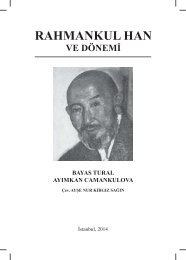THE SOVIET HISTORIOGRAPHY AND THE QUESTION OF KAZAKHSTAN’S HISTORY
SOVYET-TARIH-YAZICILIGI-ENG
SOVYET-TARIH-YAZICILIGI-ENG
Create successful ePaper yourself
Turn your PDF publications into a flip-book with our unique Google optimized e-Paper software.
<strong>THE</strong> <strong>QUESTION</strong> <strong>OF</strong> <strong>KAZAKHSTAN’S</strong> <strong>HISTORY</strong> 47<br />
said after researching many materials and other documents in files of<br />
the prosecutions made by the commission that many innocent people<br />
were falsely accused and blamed with lies. He said that in the years<br />
of 1937-8, many party members, officers, and workers throughout the<br />
society were libeled with the title of “enemy of the people” but they<br />
were never “enemy of the people” or “spies”. They were always loyal<br />
Communists, but the officers who performed those investigations<br />
slandered them with accusations that are very hard to believe.<br />
In 1988, the President of Kazakhstan’s S. Velikhanov Institute of<br />
History, Archeology, and Ethnology, R. Suleimenov, reinterpreted the<br />
fate of those Kazakh intellectuals in the period of political persecution:<br />
“The effects of the prosecution period in the 1930s-1950s are<br />
ongoing today. The unwarranted prosecution tired our intellectuals so<br />
much that later generations inherited the concept of fear. The young<br />
scientists, who had never been prosecuted, became very hesitant.<br />
With the anxiety of doing something wrong, most of them think, ‘we<br />
must live a peaceful and quiet life without writing anything wrong’”. 62<br />
Nowadays, the Stalinist phenomenon, which prosecuted innocent<br />
people, is in the past. However, in the late 1980s a big problem remained<br />
unsolved. The Alash Orda intellectuals, who struggled against the<br />
Soviet government from the beginning, were still not rehabilitated. And,<br />
Alash Orda intellectuals, not being rehabilitated, meant their works<br />
remained in the shadows. It was seen, for that to be amended, serious<br />
changes within Soviet society were needed. As late as M. Gorbachov’s<br />
Glasnost and Perestroika era, which spurred on those necessary big<br />
changes in Soviet society, the Kazakh Alash Movement’s leaders and<br />
members were eventually rehabilitated. The Kazakh people had the<br />
chance to read their books and other works. And, it proved to be evidence<br />
of Russian colonial policies in the steppe. It was evidence that<br />
the Bolshevik state had to be fully abolished in order to exculpate<br />
the many individuals victimized by Lenin and Stalin’s prosecutions.<br />
62 “Tarihtin Ar Paragı Qımbat Bizge”, Sosiyalistik Qazaqstan, 1988, 25 August.



